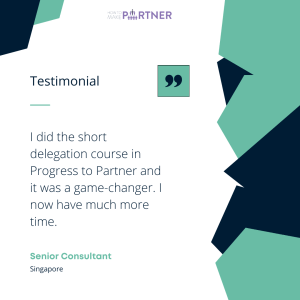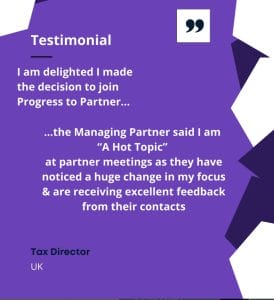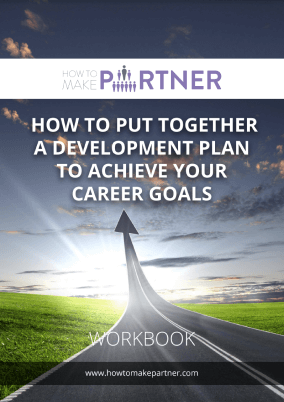Anyone who has had a career in law, accountancy or consulting knows just how demanding these industries can be. The long hours, high stakes, and constant competition create a working culture like no other. And this experience only intensifies when pursuing partnership. As a result, many people start to neglect their mental and physical health – their stress increases, their health declines, and burnout becomes second nature. Y
Yet whilst hustle culture continues to praise people for neglecting their wellbeing in pursuit of their career goals, it fails to acknowledge that healthy people actually perform better!
So, if you’re serious about making partner, it’s time to shift the conversation from sacrificing your social life, sports (and even sleep) to finding sustainable solutions to work-related stress. Here are our suggestions for how to deal with stress in the workplace. ** A lot of these coping strategies and mechanisms have been taken from extracts from my book: Poised for partnership.
You can’t pour from an empty cup
 Whilst the focus of this article is to offer suggestions and solutions to those suffering from workplace stress, it’s equally important to acknowledge why so many of us are stressed. The short answer? A total lack of balance. Imagine you have three buckets representing your career, relationship and self. However, you only have enough water to fill up one of these buckets (if you haven’t guessed yet, the water represents our finite amount of time). Now, logic would suggest you divide the water evenly amongst all three.
Whilst the focus of this article is to offer suggestions and solutions to those suffering from workplace stress, it’s equally important to acknowledge why so many of us are stressed. The short answer? A total lack of balance. Imagine you have three buckets representing your career, relationship and self. However, you only have enough water to fill up one of these buckets (if you haven’t guessed yet, the water represents our finite amount of time). Now, logic would suggest you divide the water evenly amongst all three.
However, this is where many ambitious professionals go wrong. Instead of seeking balance, they pour all their water into their career bucket. Whilst you may think that’s the fastest route to success, neglecting yourself and your relationships can have some pretty serious side effects – including burnout, chronic fatigue, stress and anxiety. Not only are they mentally and physically draining, but they can also significantly hinder your success. Therefore, we want to remind you that the road to making partner is a long one. There is no shortcut, cheat sheet or fast pass – it’s a long-term goal that requires a long-term investment. So don’t fall into the trap of taking on too much at once. Instead, prioritise your mental and physical well-being so you can consistently perform to the best of your abilities and achieve all of your career goals.
Tips for handling pressure at work
Whilst the goal is to maintain a balanced lifestyle, even the most level-headed amongst us succumb to stress and overload every once in a while. Therefore, you need to have strategies and coping mechanisms in place to prevent and relieve stress where possible. With that in mind, here are 6 tips for how to deal with stress in the workplace:
 1. Start prioritising
1. Start prioritising
If you want to make partner, you need to prove that you can handle the workload. Therefore, productivity is paramount. The best way to improve productivity (without increasing your stress levels) is to prioritise your workload. Instead of trying to do everything all at once, start ranking your tasks based on their urgency and importance. You can even create your own deadlines if that helps! Having a clear outline of your work schedule will ensure you don’t become overwhelmed or fall behind on any projects.
Take a step forwards to working on your own career development and sign up to my weekly tips here and you’ll find out what you need to be working on in your career development (and how to make the time for your career development) to progress your career in your firm.
2. Don’t overdo it
Admittedly, this isn’t always within our control. However, we all know what it feels like to have taken on more than we could (or should) chew! So, instead of saying yes to every extra task and project (in an attempt to impress your partners), focus on mastering your high-value tasks. Think quality over quantity. However, if you do find yourself in a tight spot, don’t be afraid to delegate (or delay) lower priority tasks. It’s better to do less and maintain your mental health than to try and do it all.
3. Take care of your health
 Enduring high levels of stress for a sustained period of time can be incredibly detrimental to your health. Not just mentally but physically too! Some side effects include headaches, dizziness, increased blood pressure, stomach pains, chest pains and muscle soreness. Hence, why it’s so important to know how to deal with stress in the workplace. Now we’re not insisting you become a yogi or go teetotal (but if that’s your prerogative, good for you!).
Enduring high levels of stress for a sustained period of time can be incredibly detrimental to your health. Not just mentally but physically too! Some side effects include headaches, dizziness, increased blood pressure, stomach pains, chest pains and muscle soreness. Hence, why it’s so important to know how to deal with stress in the workplace. Now we’re not insisting you become a yogi or go teetotal (but if that’s your prerogative, good for you!).
I’m simply reiterating the importance of prioritising your health. I recommend implementing daily habits that focus solely on maintaining your mental and physical health. It could be as simple as taking a walk over lunch or reading a book during your commute. Whatever it is, it’s important to have these habits in place to sustain your mood, develop long-term resilience and prevent burnout.
4. Stop chasing perfection
Perfectionism is a serious problem within our industries. Why? There are two reasons. One, because it hinders our productivity. And two, it puts an immense amount of pressure on even the smallest of tasks. So, instead of wasting time trying to perfect every piece of work, learn to step away once you’ve fulfilled your end of the bargain. You can still provide a fantastic service without pouring hours into minute (and frankly inconsequential) details. Yes, the temptation to do the perfect job will still be there (especially with the high demands and potential rewards available), but you have to realise that perfection does not exist. So stop trying to chase something unattainable.
Take a step forwards to working on your own career development and sign up to my weekly tips here and you’ll find out what you need to be working on in your career development (and how to make the time for your career development) to progress your career in your firm.
5. Regain control
 If you feel like you have no control over your workload, you’re not alone – many people (especially those in the early stages of their careers) feel the same way. The problem is this lack of control can leave us feeling stressed, anxious and at the complete surrender of our superiors. So what’s the solution? In order to regain some control, you need to be making active decisions wherever possible. Although your choices may not be monumental (or favourable), they will provide you with some control over your work schedule.
If you feel like you have no control over your workload, you’re not alone – many people (especially those in the early stages of their careers) feel the same way. The problem is this lack of control can leave us feeling stressed, anxious and at the complete surrender of our superiors. So what’s the solution? In order to regain some control, you need to be making active decisions wherever possible. Although your choices may not be monumental (or favourable), they will provide you with some control over your work schedule.
6. Take time off
Time away from work is necessary for maintaining your health and performance. Therefore, if you truly want to perform to the best of your abilities, you must stop underestimating the value of rest. Remember, lunch breaks, weekends and annual leave all exist for a reason – so stop ignoring them. You may find they are the secret to unlocking your maximum potential. Read:
- How to properly switch off from work at the weekend
- The Ultimate Guide to Switching Off When You’re On Holiday
Don’t forget to download the full Chapter 3 of the 3rd edition of Poised for Partnership. This chapter will help you work out what motivates you, what makes you tick, and whether partnership is right for you and if it’s what you want.
Download the full Chapter 3 for free here.
a
Long-term strategies for coping with a high-pressure profession
 Unfortunately, your stress doesn’t clock off at 6 pm. So, it’s vitally important that the conversation doesn’t end at how to deal with stress in the workplace (because managing stress outside of work is equally, if not more important). Therefore, the final section of this guide is dedicated to providing you with sustainable, long-term solutions for managing stress outside of the office:
Unfortunately, your stress doesn’t clock off at 6 pm. So, it’s vitally important that the conversation doesn’t end at how to deal with stress in the workplace (because managing stress outside of work is equally, if not more important). Therefore, the final section of this guide is dedicated to providing you with sustainable, long-term solutions for managing stress outside of the office:
Exercise regularly
Exercise is a brilliant way to reduce stress, develop stamina and maintain your mental and physical wellbeing. From a scientific standpoint, it boosts our serotonin levels to help clarify our thinking, reduces adrenaline so we aren’t in a constant state of fight or flight, and it improves our sleep quality. As a result, we can perform to higher standards for longer durations of time. However, whilst we would all love (and benefit from) better sleep and a sustained positive mood, some people just don’t enjoy exercise. And that’s okay! Exercise doesn’t mean going to the gym every day or running 10K – exercise can be any physical activity you enjoy. Whether you go walking, dancing, climbing or cycling, 30 minutes of exercise five days a week can significantly improve your mental and physical wellbeing.
More on this here: Your Career or Your Health – Choose Wisely
Use your annual leave
We all need to recharge the batteries every once in a while. And yet, many of us continue to delay, deprioritise or even cancel our holidays. Whilst we understand that taking a break might seem counterintuitive when you’re overwhelmed at work, it’s also necessary if you want to avoid burnout. So start cashing in your annual leave! You’ll be amazed at how time away from work can actually improve your performance alongside your mental and physical well-being.
Take a step forwards to working on your own career development and sign up to my weekly tips here and you’ll find out what you need to be working on in your career development (and how to make the time for your career development) to progress your career in your firm.
Enjoy your time outside of work
 Despite popular belief, the hours at the end of each day aren’t exclusively for catching up on emails or chasing clients. And yet, many people still consider after-work activities a rare luxury. So whilst we understand that keeping on top of your deadlines is incredibly important, we also want to reiterate the importance of looking after yourself (and having fun). As we mentioned before, you can’t pour from an empty cup – and it’s often the evenings spent with friends, enjoying yourself, that fill you back up again. So make sure you’re prioritising your enjoyment outside of work. It will provide you with the escapism and resilience you need to become partner.
Despite popular belief, the hours at the end of each day aren’t exclusively for catching up on emails or chasing clients. And yet, many people still consider after-work activities a rare luxury. So whilst we understand that keeping on top of your deadlines is incredibly important, we also want to reiterate the importance of looking after yourself (and having fun). As we mentioned before, you can’t pour from an empty cup – and it’s often the evenings spent with friends, enjoying yourself, that fill you back up again. So make sure you’re prioritising your enjoyment outside of work. It will provide you with the escapism and resilience you need to become partner.
Form a healthy, balanced diet
Everyone has different dietary needs. However, since there is such a significant link between stress and nutrition, we thought it worthwhile to discuss which foods and drinks can negatively impact your mental and physical health. Some examples proven to trigger or increase stress include:
- Caffeine – stimulation from caffeine can increase anxiety and reduce the quality of your sleep.
- Highly processed foods and takeaways – stress causes an increase in your blood sugar levels. So eating food with high levels of processed sugar will only exacerbate this problem.
- Alcohol – alcohol is a chemical depressant. So whilst it might ‘take the edge off’, it actually reduces your ability to handle stress independently (hence why so many people become dependent on alcohol).
Of course, it’s important to practice balance and enjoy yourself. But, for the most part, we recommend avoiding stress-inducing foods.
Lean on your support system
 Whether your support team includes friends, colleagues, mentors or external coaches, they are all there to support you. So don’t be afraid to lean on them when times are tough. Even if they don’t hold the solution, having someone to talk to can significantly reduce your stress, improve your mood and provide you with a fresh perspective you never knew you needed. After all, no man is an island. a
Whether your support team includes friends, colleagues, mentors or external coaches, they are all there to support you. So don’t be afraid to lean on them when times are tough. Even if they don’t hold the solution, having someone to talk to can significantly reduce your stress, improve your mood and provide you with a fresh perspective you never knew you needed. After all, no man is an island. a
Your success relies on your ability to manage stress
As you climb your way up the ladder, the air will get thinner, and the pressure will get higher. Therefore, if you want to succeed (and ultimately be named partner), you must learn how to deal with stress in the workplace. Whilst implementing these habits may require some effort (and a considerable amount of willpower) – the results will speak for themselves. So don’t underestimate the importance of prioritising your mental and physical health. They may just hold the secret to your success.
More on this here: Your Career or Your Health – Choose Wisely
a

a
Need more support?
There’s a great course in my Progress to Partner Academy called “How to put together a development plan to achieve your career goals”.
It’s one of 14 courses in Progrss to Partner! The course gives you the structure, clarity, and guidance to gain the skills, knowledge, mindset, and experience to take your career to the next stage or level – whatever you want that to be.
Check out Progress to Partner here. Premium members also unlock access to our self-study courses including The Go-To Expert, Creating A Cast-Iron Business Case for Partner, How to Delegate Like a Pro, How to Lead & Manage a Team and How To Be On Your A-Game Every Day. Join as a Premium member today and login to your Dashboard to get started








